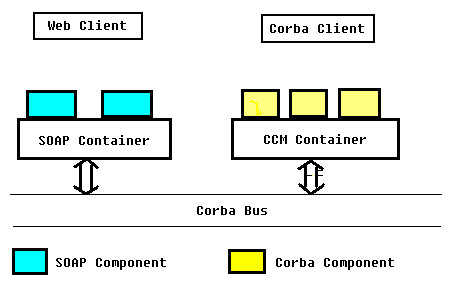
TomORB CCM is in infancy status. The container skeleton is based on OpenCCM v0.10 from ExoLab. The service container is ready for testing. Meanwhile TomORB CCM package is under restructured so as to fit the up-to-date CCM standard. The Session container and entity container are under heavily developed. The initial version should be out at the end of 2006. (July 10, 2006)

|
Most of the people belives that SOAP is the future direction of enterprise
technology. It is loosely coupled and widely accepted by almost all the major
IT vendors. No matter how the IT vendors say, SOAP is not really ready to
replace CORBA today. It lacks some of the solid features in current major SOAP
implementations.
No matter how the advantages of SOAP provides, In MS-Windows platform, a SOAP container is an IIS Web Server. In Unix platform, a SOAP container should be an Tomcat or Jetty Web Server. Almost none of the current web server provides two-phase commit transaction feature and reliable secuity feature such as Kerboros protocol (SSL/TLS is an only security option implemented in web service) Although someone argue that Web Service also provide TRASACTION and SECURITY specs to fill these two important gaps, none of the current implementation provides any widely used products to satify the custome needs. Absolutely, most of the running web service application is non-transactional and may or may not be secured by SSL. |
| No matter what I say, more and more people shift to use web service
in future. How Corba attacts the people to stay in Corba camp?
As the figure above, ... |
|